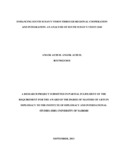| dc.contributor.author | Angok, Achuil AA | |
| dc.date.accessioned | 2013-11-21T06:32:51Z | |
| dc.date.available | 2013-11-21T06:32:51Z | |
| dc.date.issued | 2013-09 | |
| dc.identifier.citation | Masters Of Arts In Diplomacy To The Institute Of Diplomacy And International Studies (idis) University Of Nairobi,2013 | en |
| dc.identifier.uri | http://erepository.uonbi.ac.ke:8080/xmlui/handle/123456789/59670 | |
| dc.description.abstract | This study examines the possibility of enhancing South Sudan’s Vision through regional
cooperation and integration, the study analyses South Sudan’s Vision 2040 and the way South
Sudan can benefit from cooperation and integration union. The study establishes challenges and
advantages that South Sudan could face if it became a member of East Africa Community. It also
analyzes how South Sudan uses strategies of enhancing South Sudan Vision 2040. The overall
objective of the study is to analyse the role of regional cooperation and integration in enhancing
South Sudan’s Vision 2040.The study provides an overview of South Sudan’s Vision 2040;
examines the effectiveness of regional cooperation and integration in enhancing South Sudan’s
Vision 2040; and analyzes the challenges facing the achievement of South Sudan’s Vision 2040.
The study is based on realism theory of international relations: that states are the major actors in
world affairs, the international environment severely penalizes states if they fail to protect their
vital interests or if they pursue objectives beyond their means; hence states are sensitive to costs
and behave as unitary agents. The study argues that enhancing South Sudan’s vision 2040
requires regional cooperation and integration. For the new nation to achieve the country’s vision
it requires collective action of both state and non-state actors due to the anarchic nature of the
international system. The study further establishes that integration and cooperation are motivated
by a balance of absolute and relative gains and the extent of durability of such cooperative
arrangement. The research project identifies possible ways of enhancing South Sudan vision
through regional cooperation and integration. The methodology of the research involved the
collection of both secondary and primary data. Data for study was collected using content
analysis, scientific analysis and interview methodologies. The key findings in this research
revealed that the Elemi Triangle border dispute between Kenya and South Sudan is a key
challenge for the government of South Sudan in its quest for regional cooperation and integration
and South Sudan needs to understand all the principles of EAC. It is argued that South Sudan
should conduct a careful analysis of the implications of joining the EAC and, with its findings in
hand, astutely negotiate the terms of its EAC membership. Another key finding is the issues of
microfinance. | en |
| dc.language.iso | en | en |
| dc.publisher | University of Nairobi, | en |
| dc.title | Enhancing South Sudan’s vision through regional cooperation and Integration: An analysis of South Sudan’s vision 2040 | en |
| dc.type | Thesis | en |
| local.publisher | Institute Of Diplomacy And International Studies, | en |

